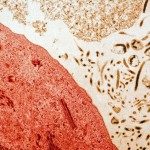Lien vers Pubmed [PMID] – 20957152
PLoS Negl Trop Dis 2010 Oct;4(10)
BACKGROUND: Ebolavirus species Zaire (ZEBOV) causes highly lethal hemorrhagic fever, resulting in the death of 90% of patients within days. Most information on immune responses to ZEBOV comes from in vitro studies and animal models. The paucity of data on human immune responses to this virus is mainly due to the fact that most outbreaks occur in remote areas. Published studies in this setting, based on small numbers of samples and limited panels of immunological markers, have given somewhat different results.
METHODOLOGY/PRINCIPAL FINDINGS: Here, we studied a unique collection of 56 blood samples from 42 nonsurvivors and 14 survivors, obtained during the five outbreaks that occurred between 1996 and 2003 in Gabon and Republic of Congo. Using Luminex technology, we assayed 50 cytokines in all 56 samples and performed phenotypic analyses by flow cytometry. We found that fatal outcome was associated with hypersecretion of numerous proinflammatory cytokines (IL-1β, IL-1RA, IL-6, IL-8, IL-15 and IL-16), chemokines and growth factors (MIP-1α, MIP-1β, MCP-1, M-CSF, MIF, IP-10, GRO-α and eotaxin). Interestingly, no increase of IFNα2 was detected in patients. Furthermore, nonsurvivors were also characterized by very low levels of circulating cytokines produced by T lymphocytes (IL-2, IL-3, IL-4, IL-5, IL-9, IL-13) and by a significant drop of CD3+CD4+ and CD3+CD8+ peripheral cells as well as a high increase in CD95 expression on T lymphocytes.
CONCLUSIONS/SIGNIFICANCE: This work, the largest study to be conducted to date in humans, showed that fatal outcome is associated with aberrant innate immune responses and with global suppression of adaptive immunity. The innate immune reaction was characterized by a “cytokine storm,” with hypersecretion of numerous proinflammatory cytokines, chemokines and growth factors, and by the noteworthy absence of antiviral IFNα2. Immunosuppression was characterized by very low levels of circulating cytokines produced by T lymphocytes and by massive loss of peripheral CD4 and CD8 lymphocytes, probably through Fas/FasL-mediated apoptosis.

